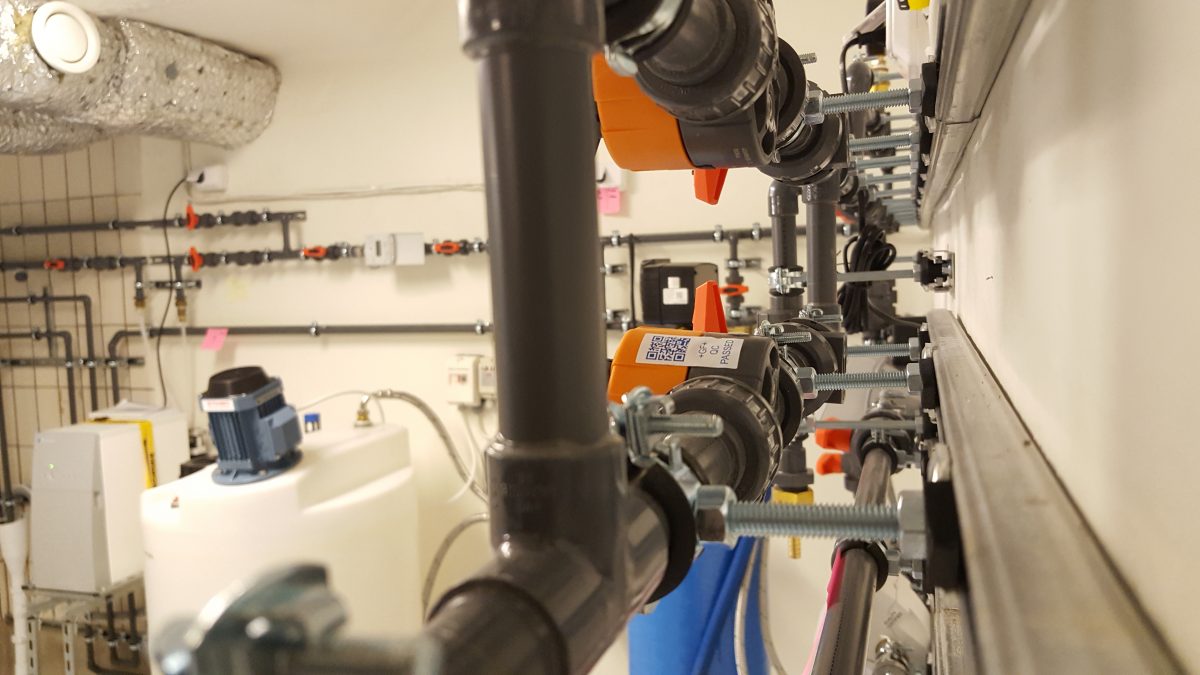21-09-18SITE 0 Invigd

Första etappen av projektet Testbädd dricksvatten är nu klar.
Det VINNOVA-finansierade projektet Testbädd dricksvatten startades under 2017 och i år står Pilotanläggningen SITE 0 på Kaserngatan 11 är färdig. Invigningen av anläggningen ägde rum den 20e september där det första filtret kopplades in och testkördes.
Läs mer om projektet här.
Är du intresserad och vill veta mer, kontakta Amelia Morey Strömberg via epost amelia.stromberg@campusroslagen.se eller telefon 0176-28 61 17.
Fler Nyheter
09/08/21 - 10:40
Nature-based solutions for water sustainability: The peri-urban challenge
UCV is co-convening a seminar at World Water Week
Project NATWIP and UCV are jointly co-convening an online seminar on the above topic at the World Water Week 2021 on AUGUST 25, 7 pm (CEST). Here perspectives and learnings on nature-based solutions (NBS) for water management in the peri-urban will be discussed – how they help close the water cycle gap and boost urban water resilience. From NATWIP, the results of the project will be shared, including presentation of NBS case studies from the Global North and Global South. From UCV you will learn about their Aquaponics project -a highly water-saving peri-urban agricultural mode.
Join the session and learn more about NBS!
Here is the link to the detailed programme: https://www.worldwaterweek.org/event/9585-nature-based-solutions-for-water-sustainability-the-peri-urban-challenge
For joining the session, registration at the World Water Week is essential. This can be done at: https://www.worldwaterweek.org/tickets. Choose the first ticket option: ”Registration Only-Limited Access” for free registration. More information about how you can join the session on the WWW digital platform will be shared later.
30/11/20 - 14:37
Inventering av utbildningar inom akvaponi
Utvecklingscentrum för vatten har gjort en inventering av utbildningar och kurser inom akvaponi, främst på eftergymnasial nivå
Inom projektet ”Akvaponi i Roslagen” har Utvecklingscentrum för Vatten tagit fram ett dokument med aktuella utbildningar inom akvaponi, både svenska och utländska. Dokumentet hittar du här: ”Akvaponi i Roslagen”- användbart material
25/09/20 - 13:19
"Akvaponi I Roslagen” participates to #EUinmyregion campaign
How the aquaponics helps complying with the sustainable development goals
With the project “Aquaponics in Roslagen” we aim to raise awareness around the social and
environmental challenges facing the food sector and the importance of adopting circularity
processes, to spread information about aquaponics and inspire different actors to adopt this
type of farming technique.
The food sector is called to face many challenges such as an increasing world population,
70% of which will live in cities and an overuse of our resources e.g. 70% of the world’s fish
stock is either fished at its limit or over fished.
Agriculture more than other sector depends on weather and climate. It will be particularly
impacted by climate change, some of its consequences being desertification, land erosion,
droughts.
Moreover, Sweden strongly depends on food imports, especially for fish, fruit and vegetables,
this contributing to CO2 emissions but also undermining the security of the Swedish food
system.
There is the need to transition towards a more sustainable and resilient food system, possibly
bringing food production closer to the consumer.
Aquaponics is a circular farming method that allows saving of water and nutrients. It
combines the culture of fish or other aquatic species with the farming of vegetables. Nutrients
rich water from fish culture flows to the growing beds and then sent back to the fish in a
circular loop. Bacteria are the stars of this system: They are responsible of the conversion of
ammonia into nitrites and then nitrates, a non-toxic form of nitrogen.
The ecosystem fish-bacteria-plant is a very sensitive one and is based on an equilibrium of
nutrients and water parameters.
How aquaponics contributes to the agenda 2030:
- • Aquaponics uses only 10% of the water used in traditional agriculture (FAO, 2014)_ SDG 6
- • Soil-less agriculture halts the depletion of soil nutrients_SDG 13, 15
- • No harmful fertilizers run off into water bodies. In traditional agriculture, farmers have to use fertilizers in order to maximize the production. The excess of fertilizers goes then to our water bodies, causing eutrophication and in extreme cases to the biological death of the water source_ SDG 14
- • In an aquaponic system the wastewater from fish is not only controlled but reused, being this an alternative and more environmental-friendly method of fish farming_ SDG 6 & 14
- • Thanks to the symbiosis between fish and vegetables, in aquaponics it is impossible to use antibiotics for fish, contrary to sea fish farming. This means that good conditions for the fish health need to be respected, being this a guarantee both for the end consumer and under the aspect of animal protection_SDG 3, 14
- • It is possible to produce in the city where the arable land available is quite limited thanks to the possibility offered by the vertical farming_ SDG 2, 11
- • Food transportation contributes largely to CO2 emissions in the atmosphere. By taking food production closer to the consumers aquaponics can have a positive effect also on this aspect_SDG 11,12,13
- • Aquaponics can be a way to ensure food security: By being able to cultivate all year around in controlled conditions that do not depend on external and climate factors we can prevent the interrumption of the food chain, particularly important under pandemics times_SDG 2
- • Soil-less farming methods are suitable for any gender, age, and even allow people with disability to work in this field since they don’t require all the movements needed in traditional agriculture_SDG 10

12/03/20 - 11:59
Fysisk rådgivning och kvällsöppet dras in
Med anledning av Folkhälsomyndighetens och Norrtälje kommuns restriktioner angående Coronaviruset (COVID-19) har vi beslutat att ställa in vår fysiska VA-rådgivning samt kvällsöppet för att undvika smittspridning.
Rådgivningen bokas som vanligt via https://www.vattencentrum.se/radgivning/ men utförs endast per telefon.
Kvällsöppet under torsdagskvällar till kl. 19 dras in tillsvidare, men du är välkommen att boka tid för rådgivning under ordinarie tider.
Epost: info@vattencentrum.se
Telefon (Växel): 0176-28 61 00




